-
2020-11-09
1. The Trump family contracting Covid
When my friend first texted me about Donald and Melania Trump contracting Covid-19, I let out a hysterical laugh. To me, it wasn’t Trump, the person, contracting the virus that was funny but rather Trump, the one who belittled the effects of the virus and avoided taking meaningful measures to minimise its impact, that was funny. It was a stark reminder that boundaries between the powerful and the powerless, between the wealthy and the disadvantaged, between the authorities and the ones subject to authority, between varying socioeconomic standings can be blurred, especially in the case of a global pandemic. While pandemics have an undeniable impact on the disadvantaged or those with lower socioeconomic means, its impact on a figure such as Trump somewhat demonstrated that no one is beyond a virus.
2. Stigmatising Migrant Communities in Victoria
When the second outbreak unfolded in Victoria, it was really interesting to, firstly, see the socioeconomic inequalities come into light and, secondly, the Victorian migrant communities framed as the problem. They were projected to be the cause of the second outbreak in Victoria which prompted the media to monopolise on this racist and bigoted rhetoric of migrants causing trouble. The media and some members of the public (through social media) insinuated that migrant communities’ culture was, by default, antithetical to the Australian way of life and thrust Victoria into another lockdown. It later became clear that the Victorian government’s hotel quarantine disaster prompted a second outbreak. The security personnel and other staff employed by the Victorian government spread the virus to a handful of postcodes in Victoria. The areas where the outbreaks first began to emerge were areas with lower socioeconomic standing and migrant communities. Considering that these staff members were from these postcodes, the outbreak seemed to be prompted and furthered by the migrant culture which supposedly allowed for the flouting of restrictions, mass gatherings and, therefore, quick local transmission of the virus. The wealthier suburbs or postcodes weren’t hit as hard. Thus, demonstrating the existing socioeconomic inequalities in Victoria and the way in which some communities were hit harder than others. It was striking to see how easily a community can be framed and dismissed as the other and the troublemaker. Additionally, this may speak to the debates or concerns which are left outside the national discussion which, in turn, can contribute to a specific historical record based on the dominant narrative. In Victoria’s case, perhaps this can be the more general covid lockdown narrative which for the average Victorian is divorced from any ethnic implications whilst for other Victorians, the connotations associated with their ethnic identities, particularly in the context of the covid pandemic, is warped and bigoted.
3. Burqa vs. facemask hypocrisy – facemasks can become the normalcy but burqa’s never will
With the introduction of the coronavirus restrictions around the world, it was interesting to see the discourse around face-covering change, particularly, in the West. For about two decades, following 9/11 in America, there has been negative messaging around the burqa some Muslim women choose to wear. It was deemed socially unacceptable and antithetical to societal norms or appropriateness. Muslim women have been subjected to vilification and have been told that the burqa limits communication and is a symbol of an anti-western patriarchal tradition. There seems to be a hypocrisy around this issue in that while a health concern can normalise a face covering, religious reasoning seems insufficient. While the historical baggage associated with the burqa far surpasses this debate of covering versus revealing the face and, of course, while the health benefits of a face mask is of great importance, there is room to view it with a somewhat binary approach. Put more plainly, it seems while the health implications of any form of face covering or clothing items can allow officials to impose policies around mandatory face covering, religion or, more importantly, freedom of choice, does not offer enough of an incentive for officials to consider burqas as societally and socially acceptable. I believe the policies begat from health concerns are of prime importance. However, these policies can coexist alongside policies of acceptance. Thus, the reframing of societal norms to accommodate for another’s interpretation of their religious obligations.
4. Family member in hospital during Covid
With the Covid pandemic, 2020 is probably one of the worst years to approach a hospital in any way. My family and I were unfortunate to have experienced a situation (not Covid-19 related) which required us to rush a family member to the hospital. I found that it was one of the hardest things I have had to cope with throughout my life. This is a photo of my family member’s patient wristband. As nurses in the emergency were asking one another about whether the incoming patients were swabbed for covid, the added difficulties of this situation were clear. The limited contact I was able to have with my family member due to the hyper alert covid environment at the hospital deeply frustrated me. These were perhaps the organic happenings of life, however, not having the option of being beside my family member and only seeing my family member for 2 hours in a day was tormenting. It was also a reminder of how varied the experiences of the lockdown and restrictions could be. Alongside the general difficulties of the pandemic and the lockdown, there could be added layers of complexity which may range from living arrangements, work, race, socioeconomic status to, in our case, an unexpected health condition.
5. TikTok dance
Similar to the millions of others out there during the lockdown, I had my fair share of busting some dance moves on TikTok with my house mate. This made me appreciate the little fleeting moments of happiness even in a very grim-looking world with the virus ravaging communities across the globe. Making this video, learning the dance moves and continuously getting the moves wrong was the most upbeat, thrilling and enjoyable fun I had during quarantine. Also, given that I thought I would never use TikTok, I somewhat understood the solace most of its users found in the app, especially, more than ever, during a global pandemic.
-
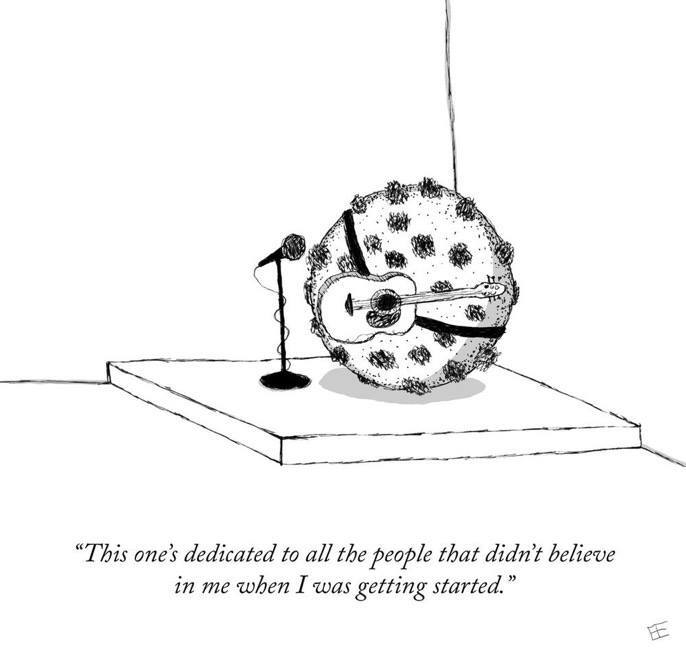
2020-10
HIST30060
These images demonsrtate the ways that people online and in charge of covid responses have responded to the pandemic.
These are all demonstrations of how I have been impacted by the pandemic, by having to leave my exchange, and by my university having been moved entirely online.
-
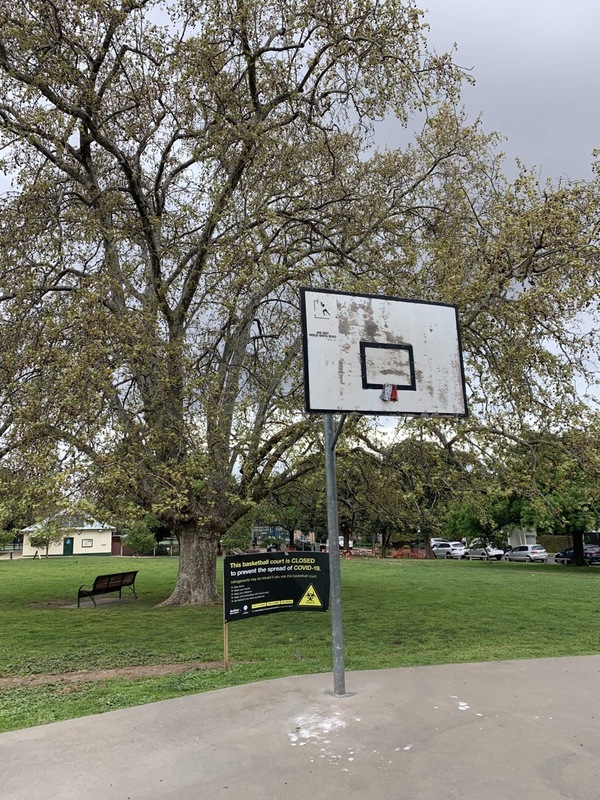
2020-09-03
This is an image I took of a basketball court at my local park that had had its basketball hoop unscrewed. As I stood there and looked at it, I realised the weight of the pandemic in terms of its social impact.
-
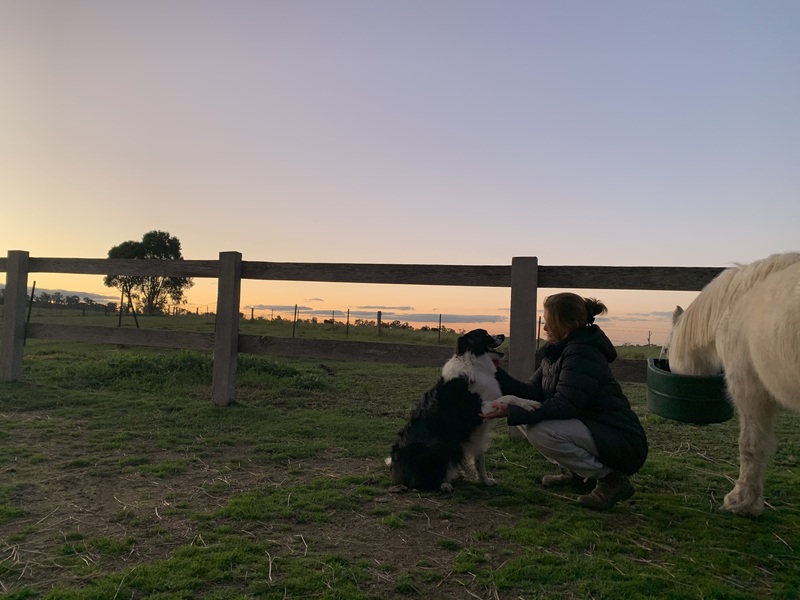
2020-07-20
This represents what friendship means to me. My dog is my best friend and was the best supporter I could ask for during the 8 months Melbourne was in lockdown.
-
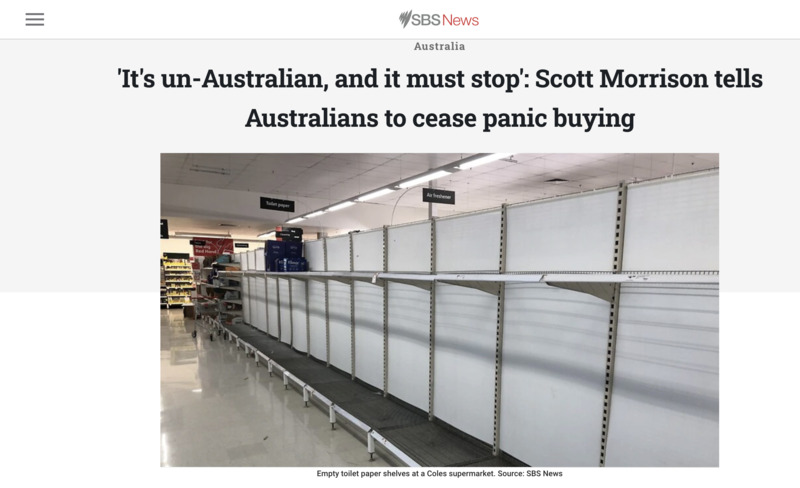
2020-03-13
HIST30060
This is an image captured in a Coles supermarket of a toilet paper aisle empty as Melbournians rushed to make sure they weren't left without during the COVID lockdown
-
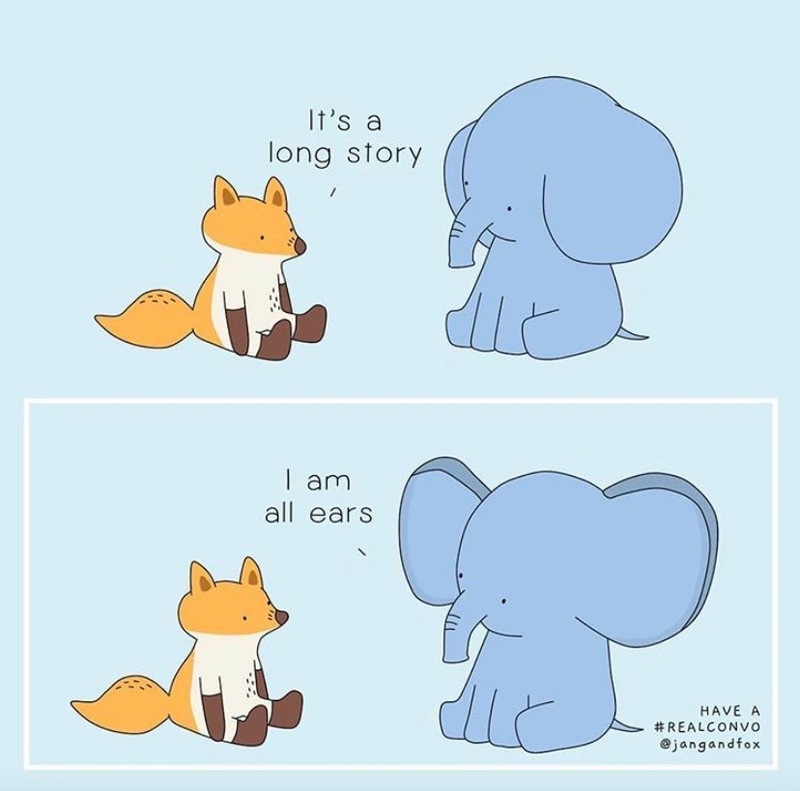
2020-07-05
HIST30060
This illustration represents the importance of reaching out to people in times of need. I chose this because it was sent to me by my sister as I suffer from severe Obsessive Compulsive Disorder (OCD) and during COVID my mental health measurably deteriorated.
-
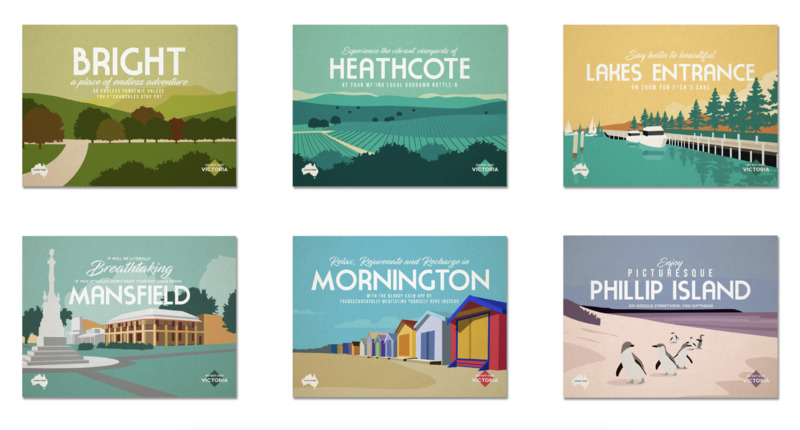
2020-06-19
HIST30060.
This is a screenshot of anti-tourism postcards that were published when Melbourne went back into stage 3 lockdown. Their purpose was to deter Melbournians from travelling to regional Victoria. I selected this source as I believed this campaign was promoting the wrong behaviour of which we should all treat each other. During COVID, being caring, kind and empathetic to one another is needed in order to get through each day, and I felt these postcards were seeking to do the opposite of what we needed.
-
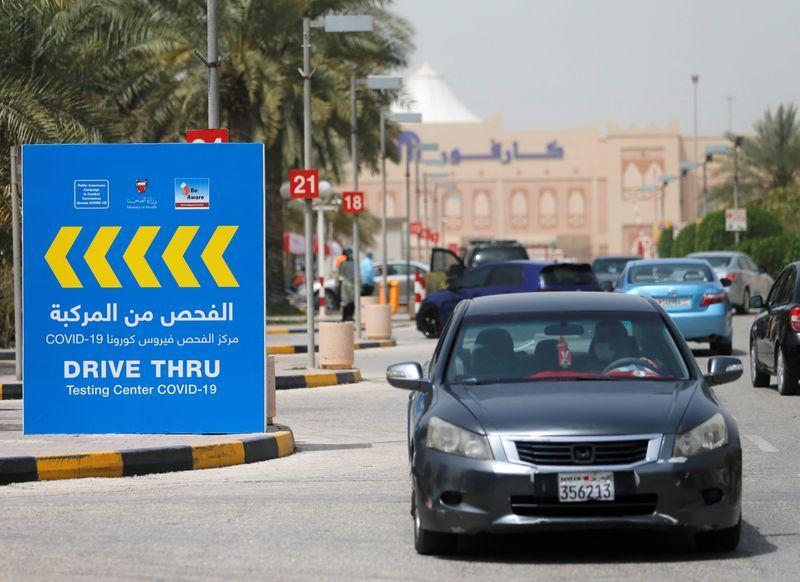
2020-07-16
The following is a reflection on my experience in COVID-19 testing and self-isolation, after returning to my home country Bahrain from Australia, where I am a student.
Upon arriving in Bahrain International Airport, travellers are taken aboard buses into a giant white tent-structure. Here, my temperature was taken. Then, I was escorted to one of the desks (mostly staffed by young volunteers) where I give my personal details, including where I intend to spend my 10 days of self-isolation (the Government of Bahrain had only recently reduced the requirement from 14 days).
After that, I had the COVID-19 PCR test taken (quick but unpleasant nose swab). The results are published via the “Be Aware” app within 24 hours. It was, thankfully, negative.
I was also given an electronic bracelet that acts as a tracker, to ensure that I am where I say I would be.
I am driven from the airport by my brother, it was decided that he would pick me up because he had recently caught the virus himself, and so, supposedly he would have developed some immunity.
Spending 10 days in one’s bedroom was as boring as one might expect. My main source of entertainment would be, as it turned out, Ancient Rome. I was still taking a university subject, which was moved online the week prior due to renewed restrictions in Melbourne after COVID-19 infections spiked in the State of Victoria. I did however have to get up at 3:00 in the morning to attend classes!
I did, moreover, end up gaining about 2 kilograms of weight in those 10 days.
The whole experience of travel and self-isolation in the age of COVID-19 is just one example of how simple aspects of our lives (travel, privacy, education, exercise, social life etc.) were changed so drastically by the pandemic. Everything would somehow be more complicated.
This reflection was submitted as part of the HIST30060 Making History project at the University of Melbourne.
-
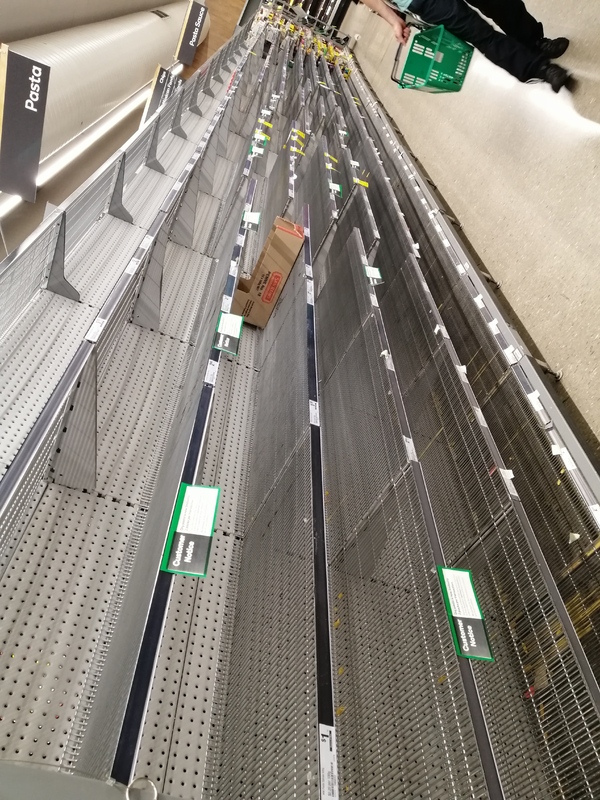
2020-03-17
When Australia first got hit with news of how devastating Covid-19, many people went onto a panic-buying frenzy, stockpiling non-perishable essential items. This is a photo taken at my local Woolworths with the pasta shelves completely gutted. Toilet paper, rice, hand sanitizer, yeast and hand soap were equally cleared out. Some stores went as far as to post signs out the front of their stores stating "NO TOILET PAPER AVAILABLE". As a young person who lives away from home, my regular diet consists of a lot of pasta (also because pasta is delicious). During this time I ended up eating a lot more vegetable soups, because ironically fresh fruit and vegetables supplies weren't particularly affected by the virus or panic buying as they wouldn't last in an impending apocalypse. It took about a month for grocery stores to re-configure their supplies, and the for the panic to die down slightly. When this first happened, the essential items were piled high front and centre at the entrance of the store: I walked in to this same Woolworths one day with a tower of 24-pack toilet pack stacked as tall as I was. This object shows how crowds can react in unexpected and instinctually self-defensive ways when threatened with a large and sweeping danger. HIST30060.
-
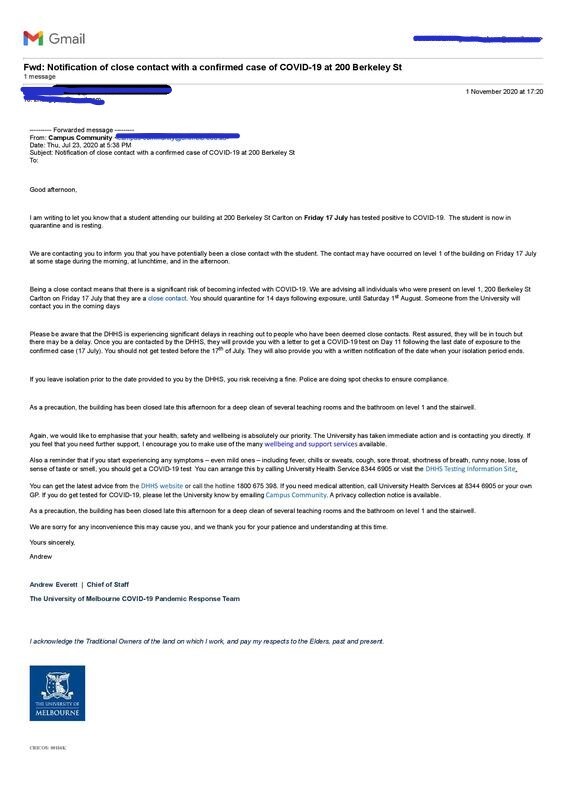
2020-07-23
This was an email sent to my brother, who is a third year Doctor of Optometry student at the University of Melbourne. One of his classmates had tested positive for Covid-19, and he had been in the same lab room doing practicals together during this time. His whole class was asked to self-isolate for a two-week period, and his exams for the semester were pushed back as well. Although he does no directly deal with Covid-19 related patients, as a healthcare worker, he must come in close contact with people on a greater basis than almost any other profession. He isolated for the required period and was tested twice, thankfully with a negative result both times. Each test required 1-2 days turnaround. This object shows the steps organisations are taking to ensure proper contact tracing and in taking care both their patients and students. It also shows how healthcare workers, who come in close physical contact with others, are inherently at high risk and need to be extra careful not to catch or spread diseases. HIST30060.
-
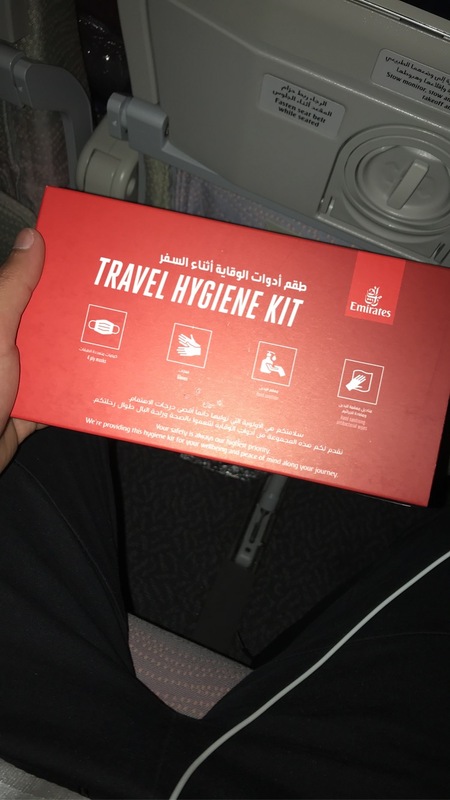
2020-07-15
If you would like to know why I was travelling, please see this journal:
https://covid-19archive.org/s/archive/item/30217
Travelling at the best of times can induce stress and anxiety. In the times of Covid-19, it is a whole different experience.
I am dropped off at Melbourne Tullamarine Airport. The departure screen, usually filled with flight information, now only has a handful of flights on display.
Incoming flights into Melbourne have been suspended entirely.
My destination is Bahrain via Dubai International Airport.
Emirates Airlines EK409 is flying at about a third of its capacity (the Melbourne-Dubai route is, at normal times, a very popular one and flights are usually almost full).
The extra room is welcome, allowing many travellers to lay down and enjoy a little comfort in these uncomfortable times.
Masks as well as gloves are required throughout the flight. A hygiene kit is provided.
I sleep for most of the flight. When I arrive in Dubai, sitting in the terminal building waiting for my connection (which is in 10 hours because of reduced flights frequency), and as a way of passing the time, I join one of my online University classes.
Three months later, in October 2020, when this journal was written, travel is still a very complicated affair. This is the worst crisis to hit the industry since the attacks of September the 11th 2001.
I will not take travel for granted ever again.
This reflection was submitted as part of the HIST30060 Making History project at the University of Melbourne.
-
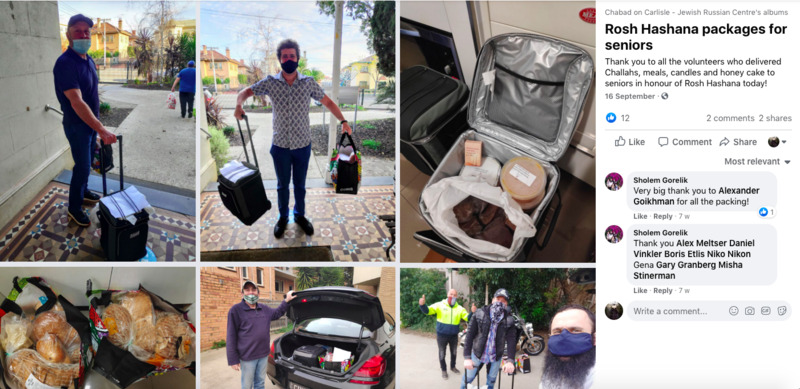
2020-09-16
During Rosh Hashanah Victoria remained in lockdown, and so Chabad on Carlisle - Russian Jewish Centre organised for volunteers to deliver "Challahs, meals, candles and honey cake to seniors in honour of Rosh Hashana".
-
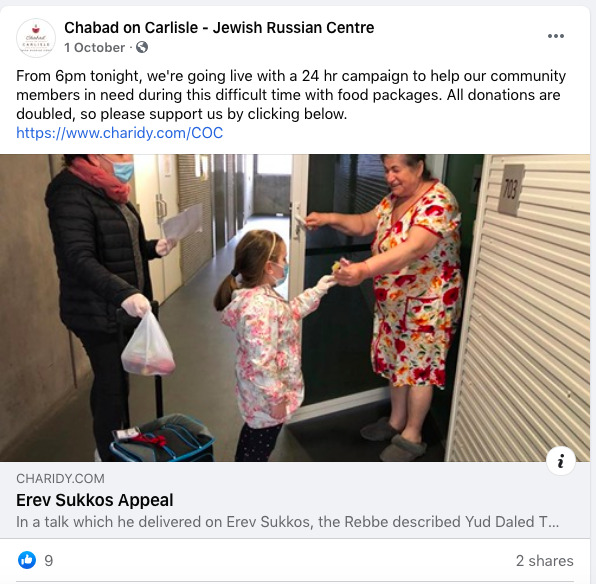
2020-10-01
Chabad on Carlisle - Jewish Russian Centre organised a fundraiser for Sukkos: "In a talk which he delivered on Erev Sukkos, the Rebbe described Yud Daled Tishrei as a day when Jews should literally splurge in giving tzedoka. This year, the call for generosity is so much greater due to the impact of Covid, and the funds you donate will be distributed to alleviate financial hardship and enable the celebration of Succos with true joy and peace of mind."
-

2020-10
Simchat Torah occurred during lockdown, and so Chabad on Carlisle-Jewish Russian Centre provided resources for their community to observe Shemini Atzeret and Simchat Torah at home
-
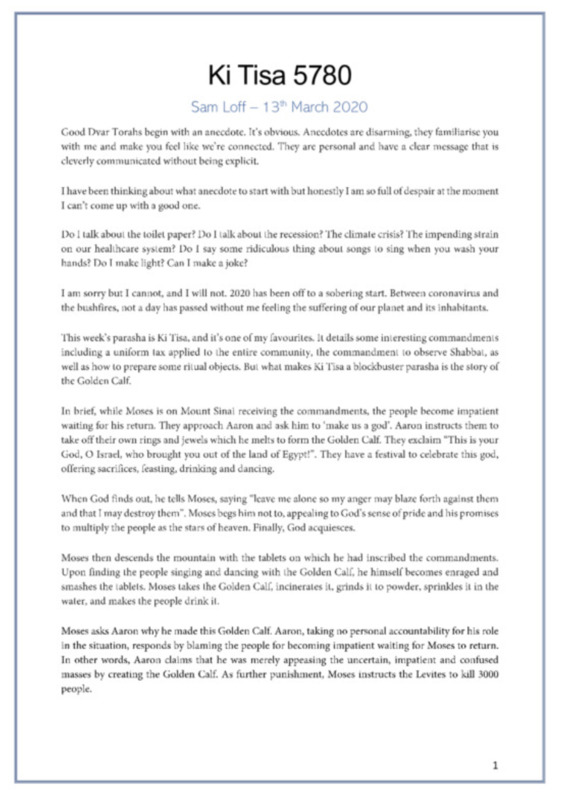
2020-03-13
At the beginning of Victoria's lockdown in March, Sam Loff delivered a drash for parshat Ki Tisa
-
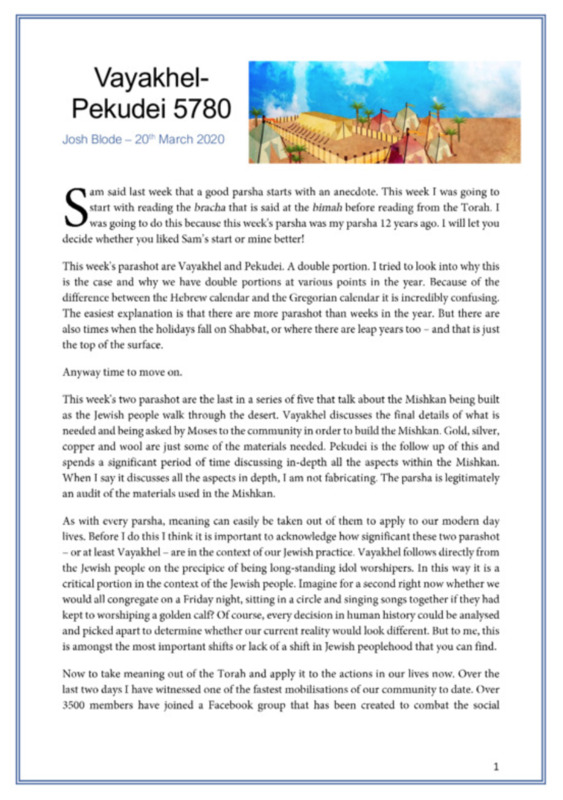
2020-03-20
Melbourne went into lockdown in March, and shortly after, Josh Blode delivered this drash at the shabbat service for Parshat Vayakhel Pekudei
-
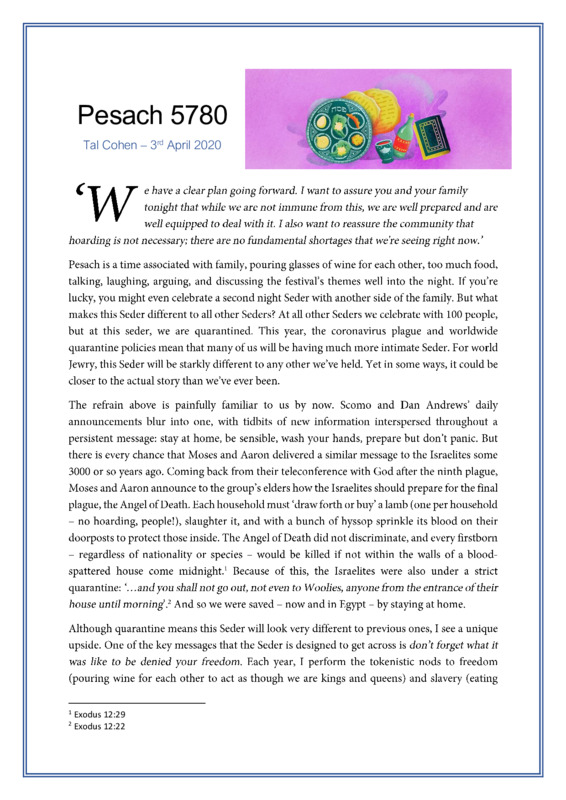
2020-04-03
Pesach in 2020/5780 came at the beginning of Melbourne's lockdown, and services were held online. Tal Cohen delivered a drash during Kehilat Kolenu's services.
-
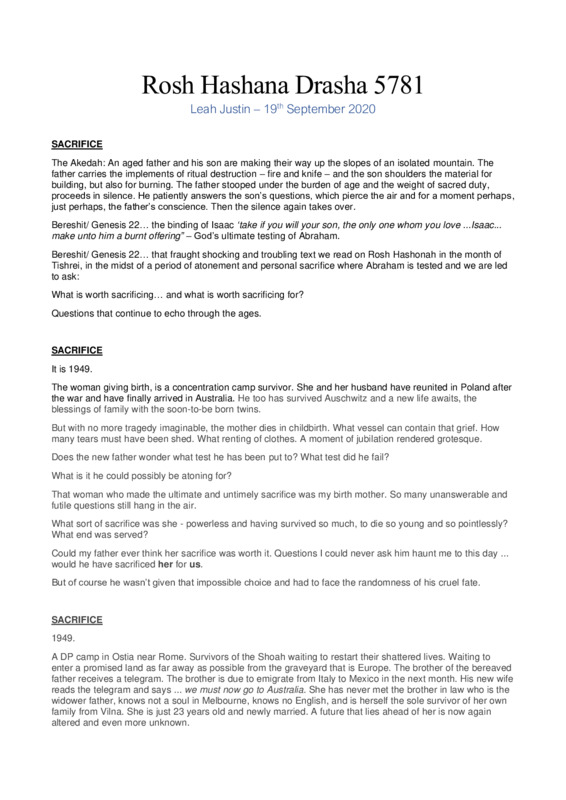
2020-09-19
Kehilat Kolenu had an online service for Rosh Hashanah, due to Melbourne's lockdown, and Leah Justin delivered the drash
-
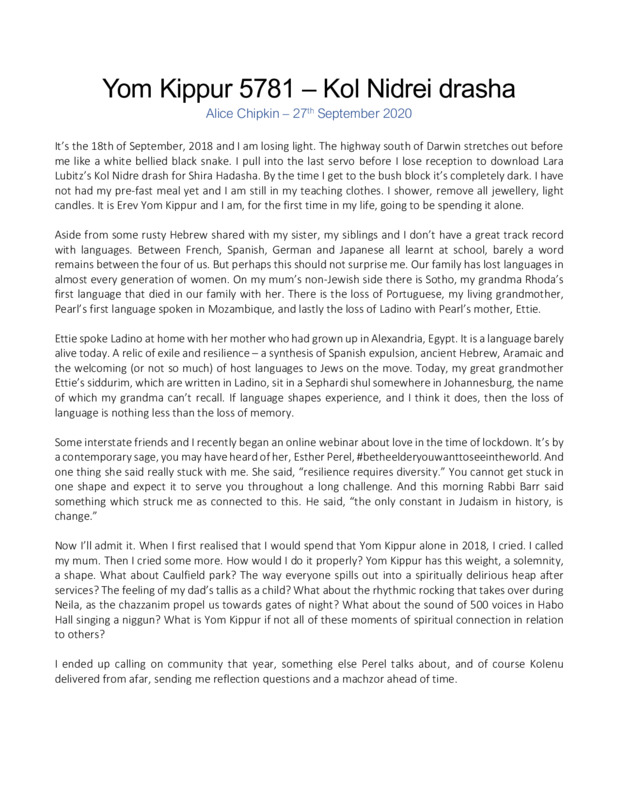
2020-09-27
Kehilat Kolenu ran services online for the High Holy Days, and shared the drash that was delivered by Alice Chipkin for Kol Nidre
-
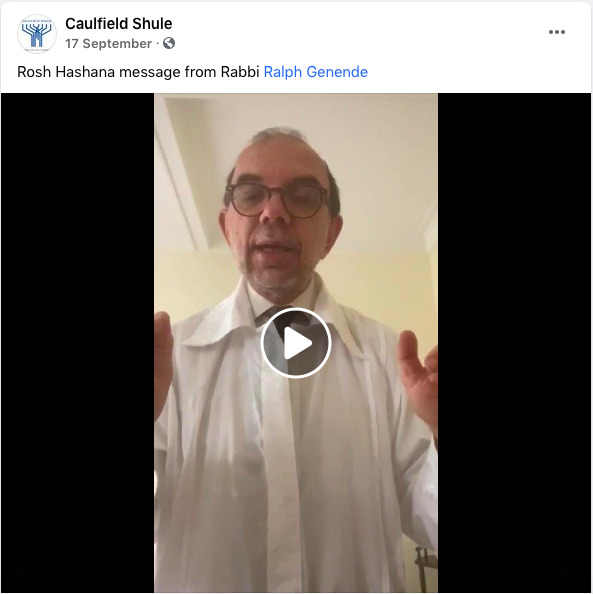
2020-09-18
For Rosh Hashanah, Caulfield Shule's Rabbi Ralph Genende pre-recorded a sermon and a short video celebrating apples and honey
-
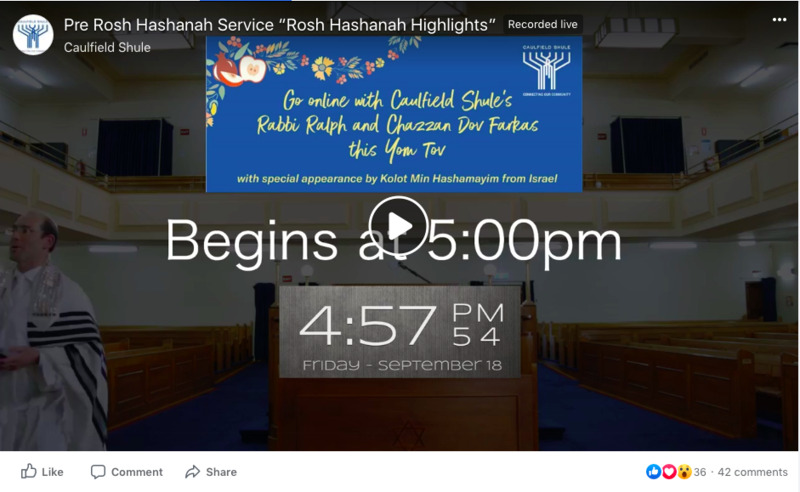
2020-09-20
While synagogues were closed under lockdown for Rosh Hashanah, Caulfield Shule provided a 'Rosh Hashanah highlights' service online before Rosh Hashanah started, as well as a standalone video of the Chazzan singing a "Rosh Hashanah Highlights Medley" with a choir in Israel
-
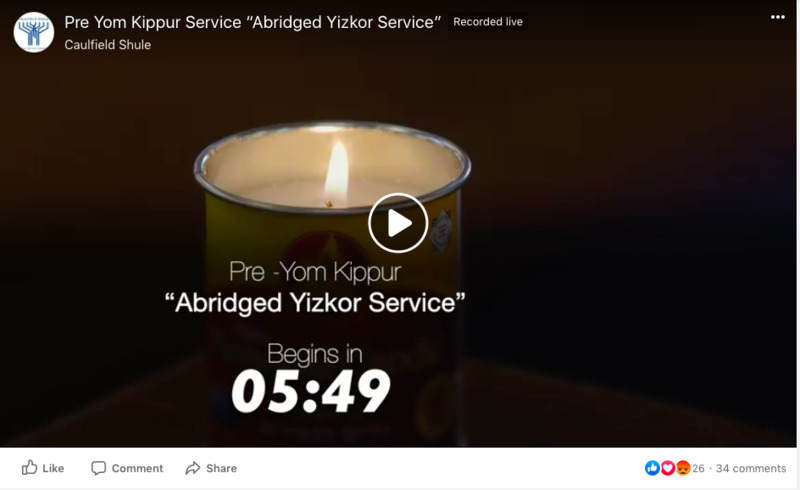
2020-09-28
Due to the lockdown, Caulfield Shule was unable to have a Yom Kippur service. Instead, they pre-recorded abridged Kol Nidre and Yizkor services, and livestreamed an abridged Neilah service after Yom Kippur had ended.
-

2020-09-29
Caulfield Shule was locked down and unable to hold a Yom Kippur service in person, so as part of their online content they posted a video of "Chazan Dov Farkas and Kolot Min Hashamayim singing Avinu Malkeinu. Dov was recorded in Melbourne, the choir recorded in Israel, which was all blended together with the help of technology!"
-
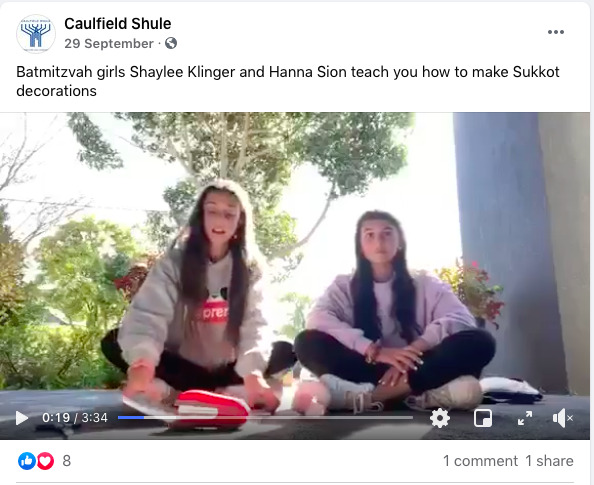
2020-09-29
A video as part of the online programming for Sukkot from Caulfield Shule: "Batmitzvah girls Shaylee Klinger and Hanna Sion teach you how to make Sukkot decorations"
-

2020-10-08
"Go online with Caulfield Shule's Rabbi Ralph and Chazzan Dov Farkas this Yom Tov for a Pre-Shmini Atzeret “Abridged Yizkor Service”
Thursday Night, 8th of October, 8.00–8.20pm"
-
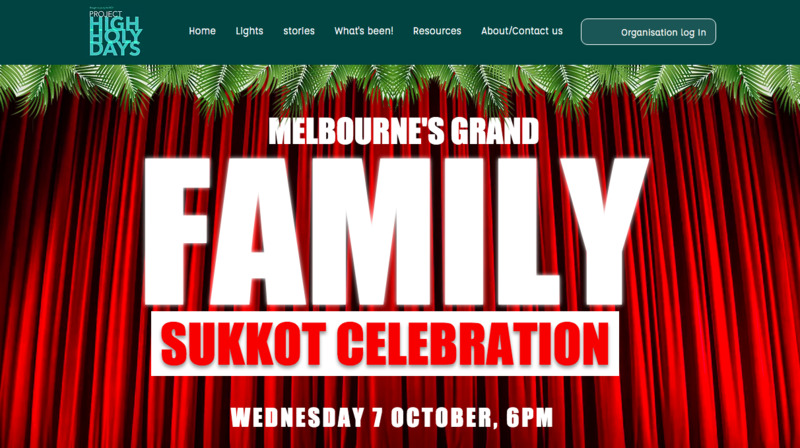
2020-10-06
Organised by a range of Jewish organisations, including Project High Holy Day, a virtual Sukkot party was held online.
-
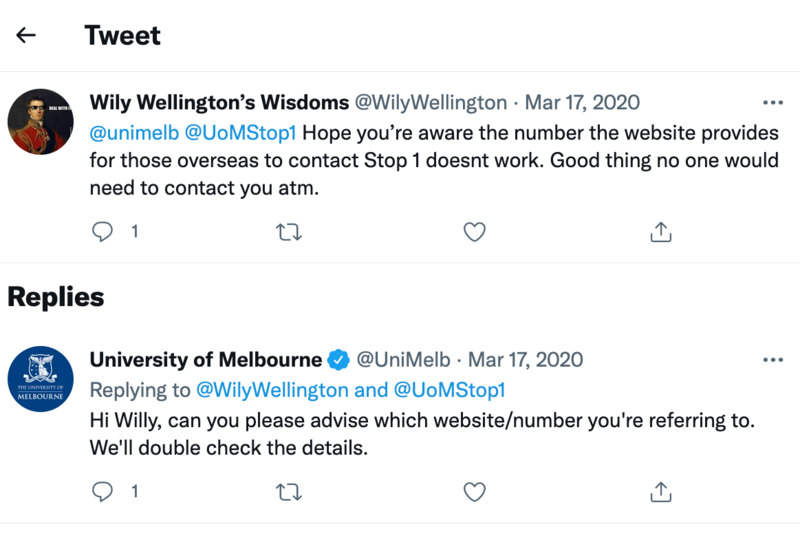
2020-03-07
HIST30060
I was on exchange in Edinburgh when Covid broke out. My fellow Australian friends were very unsure of what decision to take in reaction to the outbreak. Most if not all of us underestimated the magnitude of the pandemic and thought that life would go on, albeit with news broadcasts talking more about Coronavirus than Brexit. Most of us hoped we could "ride it out" in Scotland and still have the holidays we had planned. There was some discussion of renting an apartment and living their together, though this was mostly just talk. Eventually, some of our Austrian friends decided to go home because they worried the borer would close and they would not be able to get back into Austria. This brought home the severity of the pandemic, and everyone was rather glum for a time. However, beer is a wonderful thing. Our Austrian friends left, and us Australians started to have serious thoughts about going home but no one wanted to be the first to say they would go because they feared this would be the straw that broke the Camel's back and their departure would precipitate our decisions to return home. I decided I would go home if one of three conditions was met, Australia announced they were going to close the border, everything in Edinburgh shut due to lockdown, or classes and student events ceased to run. Soon most student societies, of their own accord, elected to cease in-person events without official prohibition. Australia also announced a 14-day quarantine for new arrivals. Two friends said they had decided to return home, I called my mum, we both agreed there was no sensible reason for staying in Edinburgh no matter how much I might wish to stay. I thought I would leave within a week because there was much admin to be done, but the threat of their being no more flights into Australia meant my departure date became as soon as a flight could be found. One the day I went to fly home, my flight from Edinburgh to Munich was cancelled and I had to train from Edinburgh to Manchester and from there begin my airborne journey back home. Manchester Airport was the grimmest wait for boarding in my life. When I arrived in Munich nothing in the airport was open. My next flight was to Tokyo. Everything in the airport was open. I got Sushi whilst I waited. I got a lot, I was flush in the funds with 4 months worth of holiday money was no longer going to spend. I then flew to Sydney. And after that to Melbourne. Mum picked me up, drove me home and I got to see my Dog for the first time in three and a half months. This sort of but didn't quite make up for my exchange ending early. The 14 days in quarantine sucked.
The documents I have attached consists of all the emails I received from the University of Melbourne regarding Coronavirus and students currently on exchange. I have submitted them because they document the way in which Covid has most effected my 2020. Fortunately, I have not suffered as have others. The phenomena of students being on exchange when a pandemic breaks out, seems one which is unlikely to have occurred before, let alone on such a grand scale. I have also attached a screenshot documenting a Twitter exchange with Melbourne uni addressing the fact that their international number was not working.
-
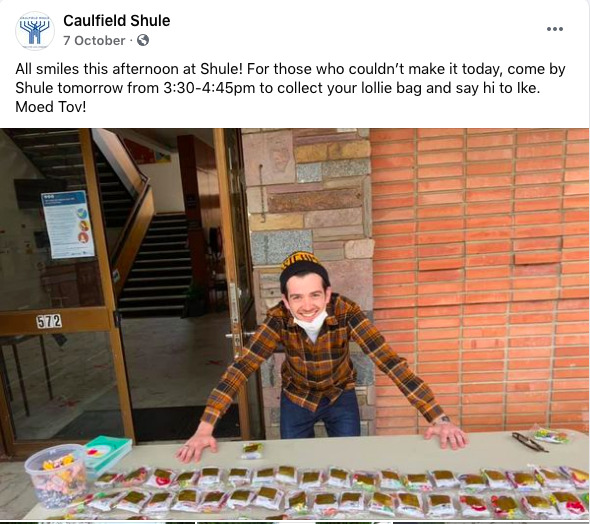
2020-10-07
Melbourne was still in lockdown during Chol Hamoed Sukkot, so Caulfield Shule organised treats for their congregation, encouraging people to come down and pick them up.
-
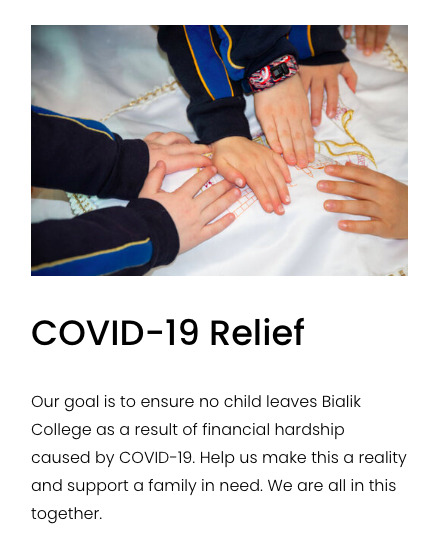
2020
Amongst its other fundraising efforts, Bialik College launched a special 'Covid-19 Relief' fundraiser: "Our goal is to ensure no child leaves Bialik College as a result of financial hardship caused by COVID-19. Help us make this a reality and support a family in need. We are all in this together."
They also launched a fundraiser to create new outdoor spaces: "Help us transform our outdoor amphitheatre into a flexible event space. With current social distancing measures in place as a result of COVID-19, we need to think creatively to look for alternative ways to gather as a school community."
-
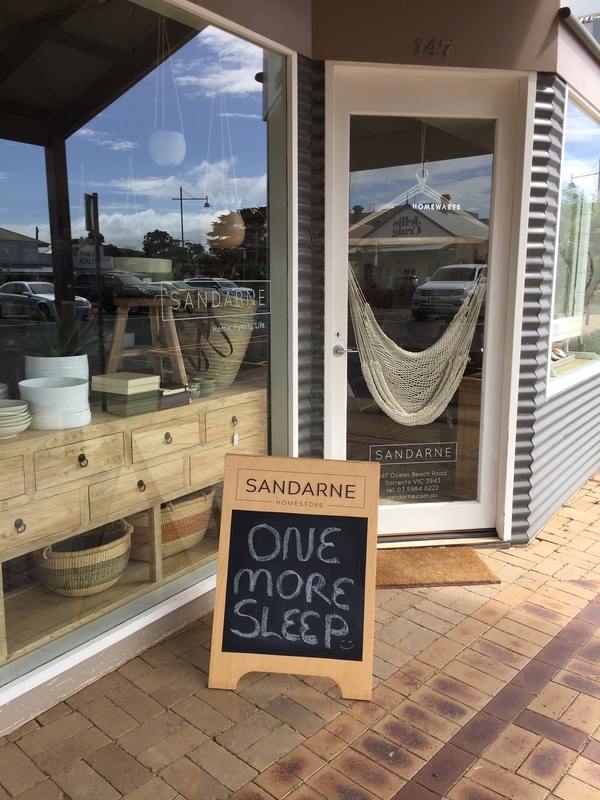
2020-10
This collection of photographs were all taken during Melbourne's second-wave of Covid-19, towards or right at the end of our severe lockdown. After a fairly miserable winter and hundreds of cases each day, the light at the end of the tunnel was often pretty hard to see - but when the announcement finally came that it was safe to start opening up, it coincided with some of the most beautiful spring weather we'd seen. The local shops on the Mornington Peninsula started sharing a countdown until we could visit them again and it felt a bit like being a kid at Christmas.
-
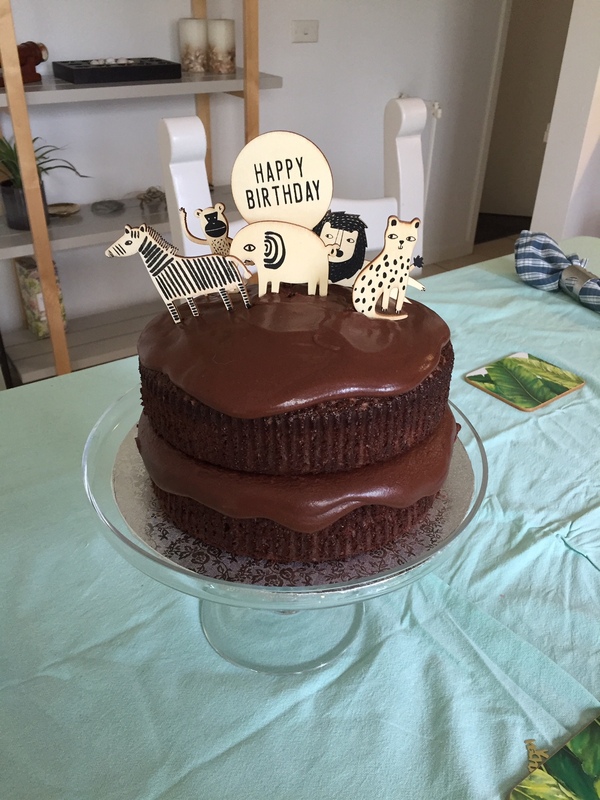
2020-04
When the pandemic caused Melbourne to more-or-less shut in March, my year 12 brother who attends a boarding school, and I, who lived in the city to be closer to university, had to move home to the Mornington Peninsula with our parents. All four of us, and our two dogs, celebrated our birthdays in lockdown - and not just any birthdays; my mum turned 60, my brother turned 18, and I turned 21. We had high hopes for grand celebrations which were obviously not possible under the government restrictions, so instead we did what we could from home and the celebrations were very special. Even though we didn't have access to some of the things we normally do for birthdays (e.g. dinners out at restaurants, movie tickets etc.) it was so nice to see the effort we put in to make each other's day special.
-
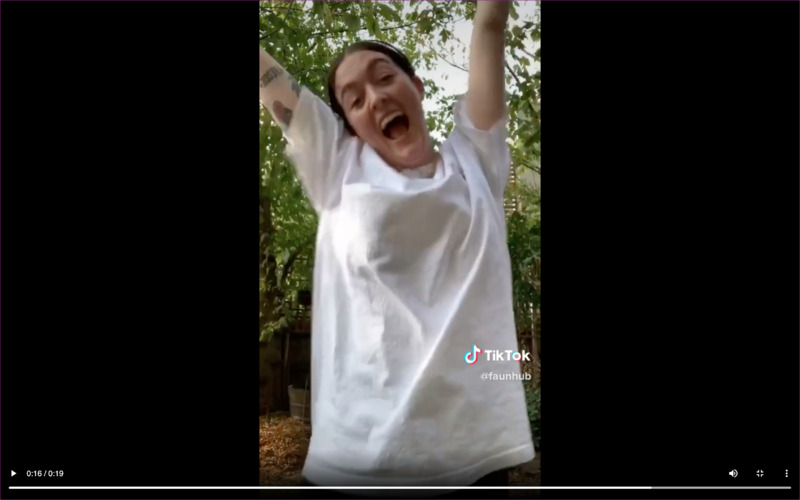
2020-04-01
This is a TikTok video created and uploaded by user @faunhub. TikTok seemed to become massively popular over lockdown, globally, with people using it make light of what was a very strange situation for everyone, as well as share useful tips and 'hacks' as such related to the pandemic. This particular video encapsulates how bizarre TikToks can get; user @faunhub is dancing tp a speech by Scott Morrison announcing the closure of recreational facilities, placed over a backing track, and making light of his mispronunciation of the word 'barre'. For me, this video and others like it helped to soften the blow of the multiple announcements of restrictions varying in severity and showed how comedy as a coping mechanism was applied in the context of this pandemic.
-
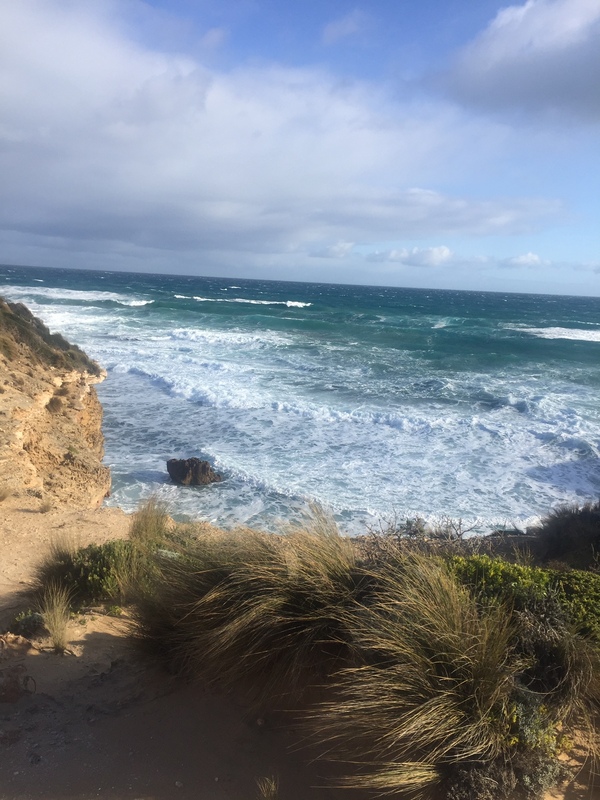
2020-08
I spent lockdown on the Mornington Peninsula; when the 5km radius restriction was put in place my family and I couldn't help but laugh - most of our 5km was in the water...While there were absolutely days where I felt that my world had shrunk immensely, I was always so appreciative to have the ocean less than a ten minute walk away. I probably visited the back beach four or five times a week, finding that the enormity of the ocean put things in perspective for me and helped me to ground myself when things were overwhelming.
-
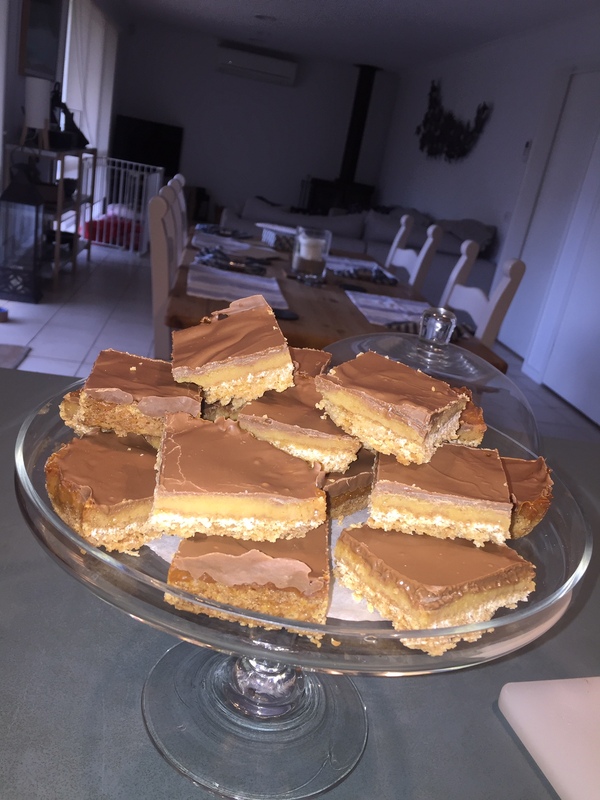
2020-08
During isolation, myself and many others turned to baking as a way to pass time and enjoy a treat that didn't require anyone to leave the house. Perhaps more than this though, I felt that whatever I was baking was something that I had complete control over, so long as I followed the recipe, and in 'these unprecedented times' as the tag-line goes, this little bit of certainty was precious.
-
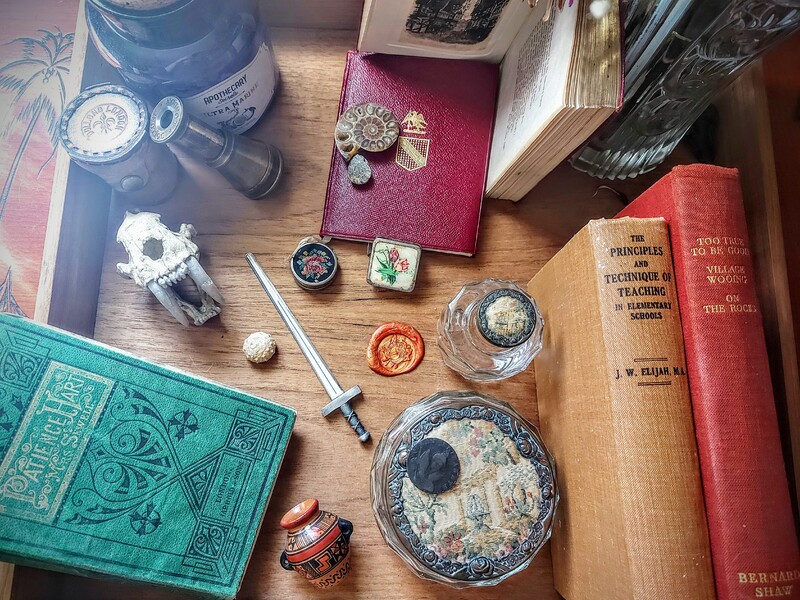
2020-11-08
HIST30060
It might not come as a surprise for people to learn that I, a history major, likes old things! Throughout this pandemic, I have become a frequent visitor of Etsy, searching for interesting vintage items to purchase. I have come out the other side of this pandemic with several old books, a set of 1950s cosmetic pots, a leather satchel and two old measuring tapes. Of course, in addition to things I have already collected over the years, including fossilised ammonites, more old books (including two copies of Shakespeare from the 1790s) and a pocket telescope from the 18th century.
I feel like many people have indulged themselves during the pandemic, especially given the increased payments from the government allowing some people to have disposable income. And without having daily expenses such as public transport fares, for the first time I have been able to purchase some of these items without feeling guilty about myself for doing so.
It makes me think about what type of things people do to cope during times of crisis. For me, clearly, it was some retail therapy, buying things that I enjoy. I am sure that many people will relate to that, considering the sheer amount of parcels the post office has to deal with from online shopping. I had always admired history from afar, but knowing that I can physically handle objects that have their own stories to tell has just reinvigorated my love for every chapter in the large book we call history.
-
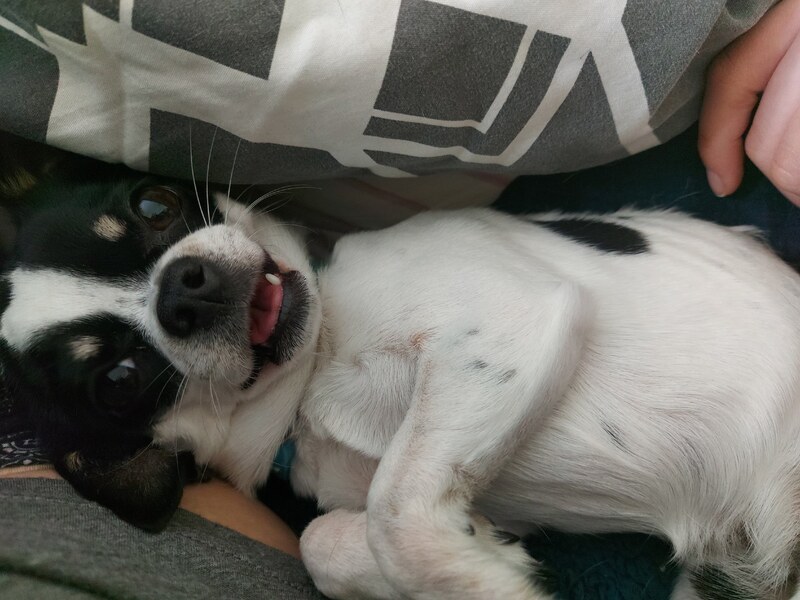
2020-07-26
HIST30060
During COVID it was definitely a comfort for many to have their pets. Whilst the world was figuratively and literally burning down around us, the unconditional love and easy needs of caring for a dog brought a small moment of respite in the day. A dog will always enjoy a treat.
It makes one think about the perspective of dogs during this time. For my dog, Goliath, he now gets to see me every single day, compared to me leaving at 7 in the morning and arriving home at 4pm (sometimes later) when I was studying on campus. And he gets more walks because leaving the house with him was some of the only times we actually got to leave the house. A dog will always enjoy a walk.
Just having another creature near you who enjoys the little things and isn't weighed down by the dread and despair of the pandemic and who I get to share the company of really helps.
-
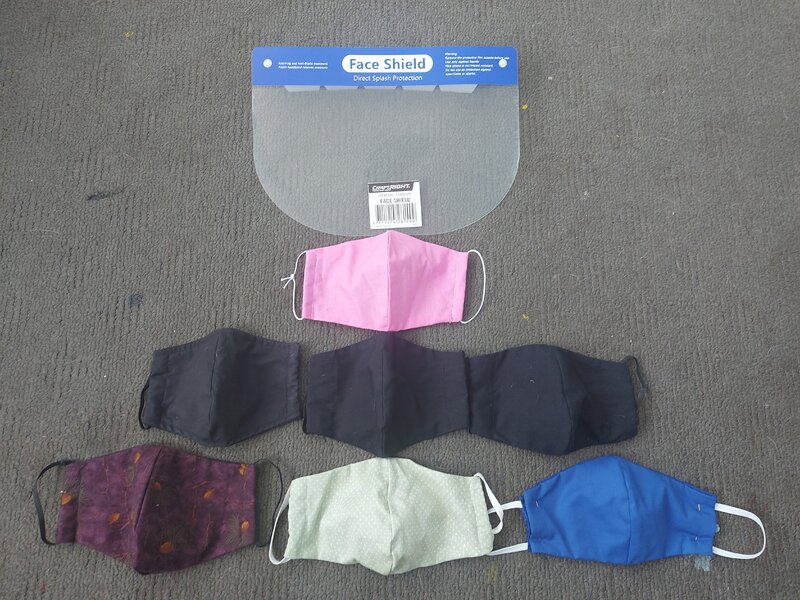
2020-11-08
HIST30060
This photograph is of the variety of the face masks used by myself and my sister throughout this pandemic. I like how it shows the variation in information that was received by "Dan the Man", Premier Daniel Andrews. First, any type of mask was allowed to be used (including some single-layer ones seen here). Then the recommendation was triple-layered masks. And now, face shields are not allowed to be worn. Not that my sister or I ever actually wore the face shield - that was given to us by our grandmother. Actually, all of the masks we have were sewed by our grandmother. For that, I am grateful because it saved us from having to deal with the rush of finding and purchasing masks after were made mandatory.
I like to think that if people time travelled to today from even a year ago, they would question such an odd fashion choice. And that is what they have become for a lot of people, a fashion choice. I recall seeing during the Melbourne Cup a lot of co-ordinated masks with outfits, and they have opened an avenue for people to display their interests on their face. A new and unexpected way for people to connect, even as our expressions are being masked.
All I can say is that I'm grateful for the majority of Melbournians taking to these masks, and even though we had our fair share of "Bunnings Karen," we are far better off than other countries.
-
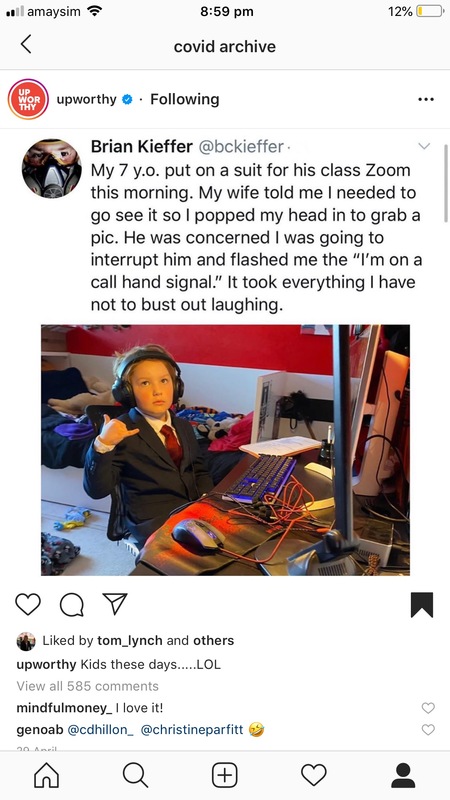
2020-04-30
(HIST30060) As a result of Victoria going into lockdown, classes at University of Melbourne went online, with lectures and tutorials being delivered via Zoom. Through both semesters, many technical and other issues have occurred as we've all learned how to use Zoom and gotten used to online learning. This post reflects what I'm sure many people experienced while on a Zoom call; for me, it was my mother walking in on my countless times, forgetting when I would have class, while she also worked at home, and both of us wearing something nice and presentable on top with our athletic/leisure wear out of shot.
-
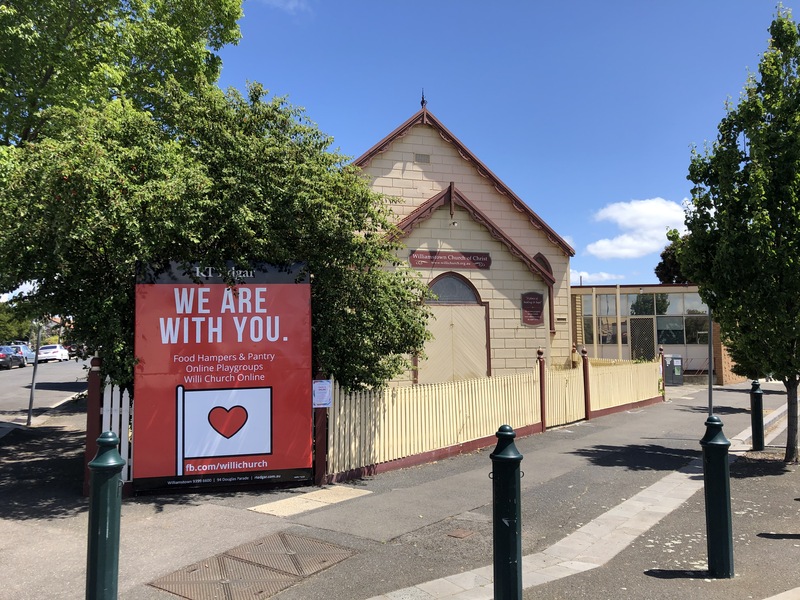
2020-11-05
The Williamstown Church of Christ put up a sign on the front fence to advertise food hampers and online services that are being provided during the lockdown. On the right of the image, in front of the reflective building, you may be able to see a grey box. This is a pantry where members of the public can leave their groceries for others to collect.
37°51'17.8"S 144°53'50.5"E
HIST30060
-
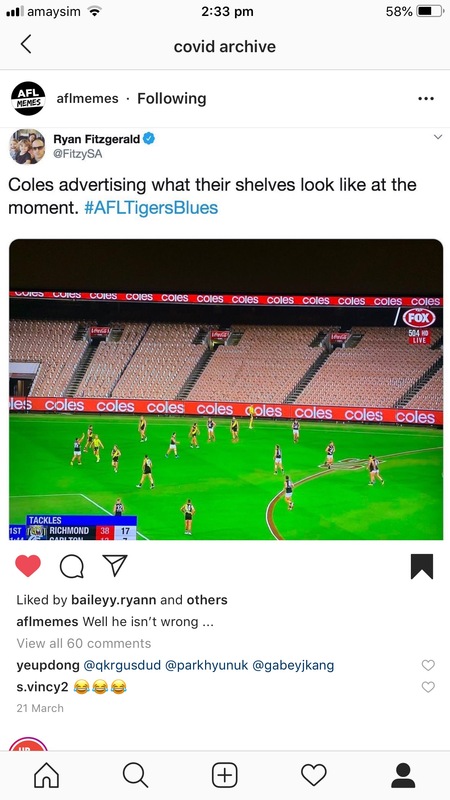
2020-03-21
(HIST30060) As an avid footy fan, it was upsetting and very strange to see the 2020 AFL season starting without being able to attend the game at the MCG, or there be anyone in the seats when watching it on tv. This post reflects this strange moment in AFL history, but also the coinciding rush on supermarkets, particularly toilet paper, leaving lots of shortages and empty supermarket shelves. I still don't understand why seemingly everyone in Victoria and Australia decided they needed to stock up on toilet paper, but it was definitely an aspect of a very strange and stressful period at the start of the pandemic.
-
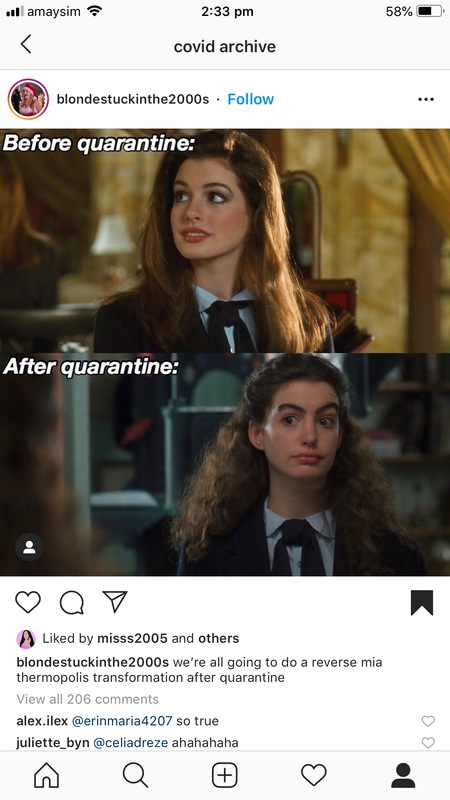
2020-04-17
(HIST30060) With lockdown lasting for many weeks and hairdressers and beauty salons being closed (even for a while as restrictions were eased), people's well-kept and manicured looks went out the window, being replaced with long, untamed hair and eyebrows and tracksuits. We went from looking like Princess Mia to ordinary, bushy-haired Mia as in the image. Many people resorted to giving themselves and family haircuts at home (I cut my hair twice and fringe multiple times throughout lockdown), which had varying results and became an essential covid experince on social media.
-
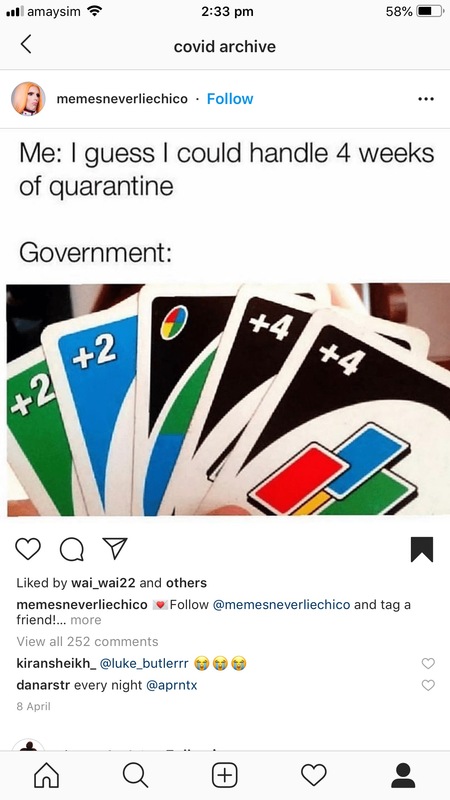
2020-04-08
Back at the start of the pandemic, everyone thought we would locked down and at home for about 2 weeks, and then things would start getting back to normal. Little did we know that 9 months down the track would countries still be going into lockdowns and others having lighter restrictions. As the weeks went on and the case numbers kept rising, the level of restrictions increased as did the number of weeks we were in lockdown (Melbourne is just now slowly coming out of a 15 week lockdown, one of the longest in the world).
-
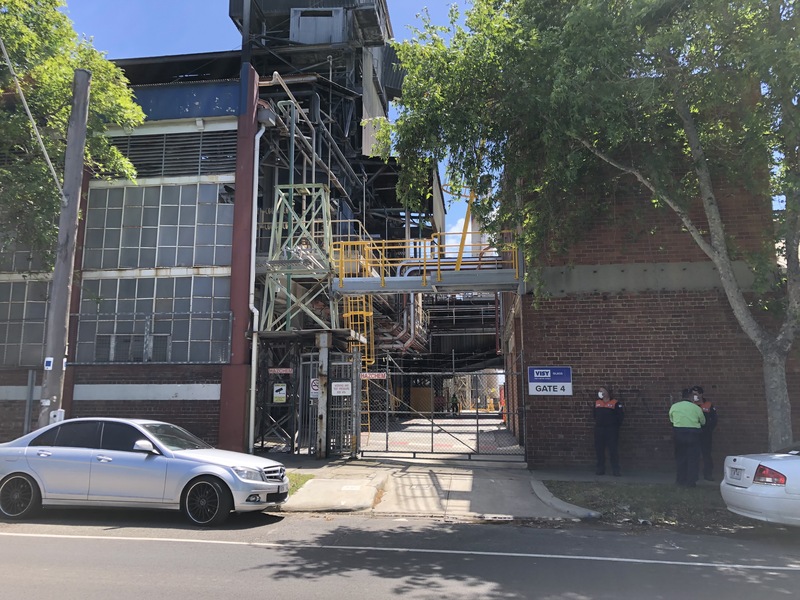
2020-11-05
The glass factory is in the middle of Spotswood, a suburb close to central Melbourne. The factory produces glass containers for many products including baby food, vegemite, beer, wine, jam, and kombucha. They have been very busy this year, thanks to panic buying. One staff member stated that production had been high since March 2020, just like it was in Christmas 2019, the peak season for glass production. Glass bottles are made around Australia as they are quite difficult to transport, so they cannot be outsourced to overseas manufacturers. This facility has around 100 staff.
In these images you can see some staff having a break out the front of the business. They are wearing masks in accordance with Victorian (state) laws. In the other image you can also see that the workplace is taking temperature checks to reduce the risk of virus transmission.
37°49'49.5"S 144°53'30.5"E
HIST30060
-
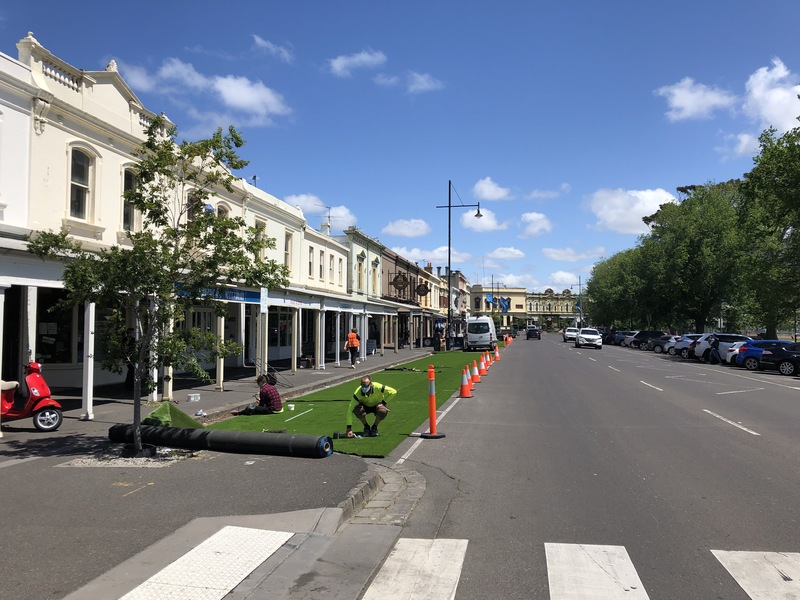
2020-11-05
Metropolitan Melbourne is emerging from its second lockdown. Here you can see workers laying artificial turf out the front of some hospitality venues. The turf covers car parks, but it will increase the outdoor seating capacity of these venues. This will stimulate the small businesses and reduce the risk of virus transmission, as customers will sit outside rather than inside. I believe that the approach here is modeled on the Open Restaurants initiative of NYC, USA.
37°51'47.5"S 144°54'17.0"E
-
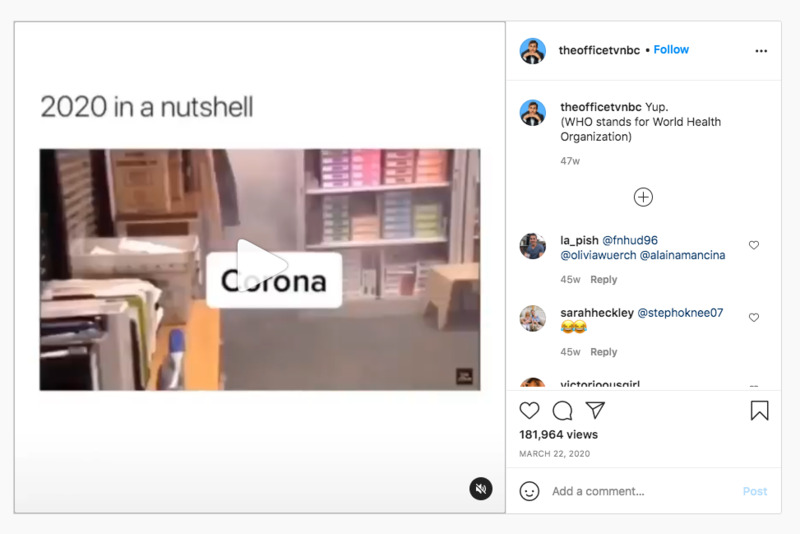
2020-03-23
(HIST30060) This video was posted about the time in March when most of the world started going into lockdown and Covid-19 cases were increasingly rapidly everyday, particularly in Europe at that time. At uni, we'd just started online classes as Victoria went into lockdown. The video is great at demonstrating the chaos that existed as the situation became a global pandemic, when nobody knew what was going to happen the next day or really how to deal with what was occurring.
-
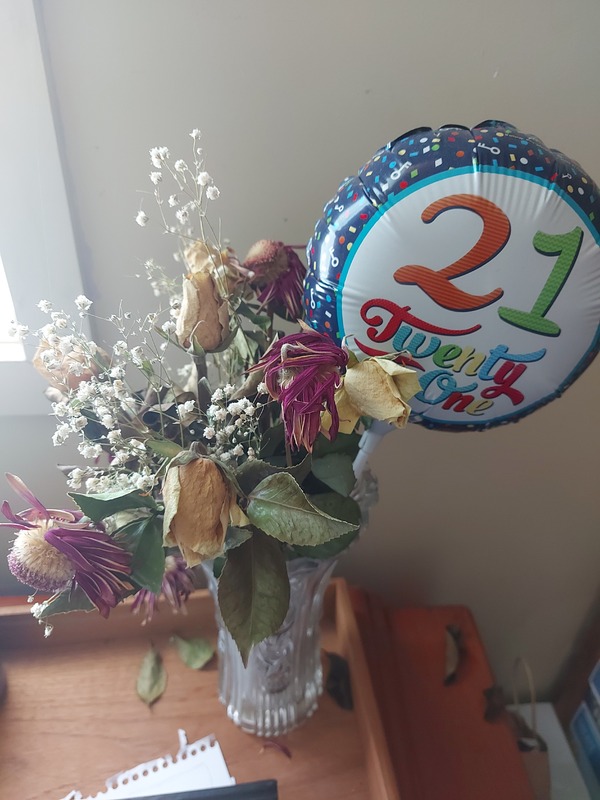
2020-11-04
HIST30060
A person’s 21st birthday (whilst not as big a deal in Australia as other countries) is still considered an important milestone. I, like many other people in Melbourne, had the pleasure of experiencing my 21st birthday in lockdown. Friends were not invited. Family could not visit. Instead, I spent the day at home with only myself, my sister and my dog. I feel like this picture accurately represents what the time was like. Dead. Not literally, of course, but life had grinded to a halt during this period. And yet, that day was one of my happiest. Maybe because it gave an excuse for people to contact me. A theme I think runs through a lot of the pandemic. Because we could not meet physically, social interaction through technology became a lot more prevalent. And who doesn’t love being sent cupcakes?
-
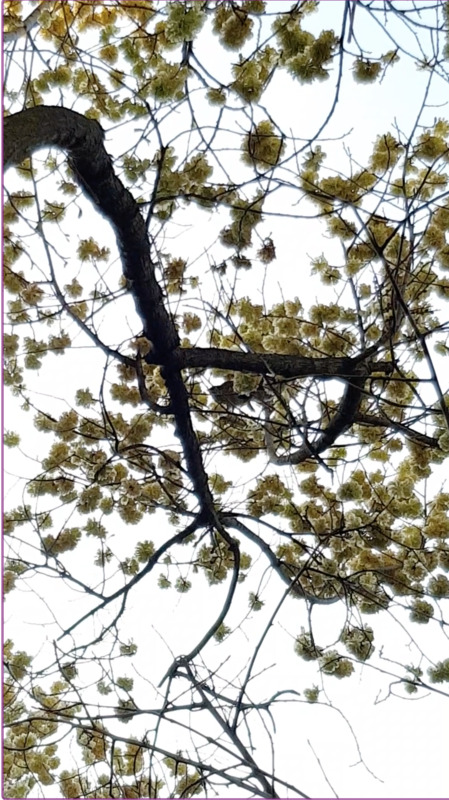
2020-09-28
Like many people, I've been spending a lot more time in my back yard this year. Once the weather started getting nice enough our household and the neighbours all seemed to have the idea to start barbequing, just for something different to do, and we often had barbeques going in three back yards along at the same time. One such day I spotted two baby wattlebirds in the tree. I spent a good few hours that day, and the next few, just watching them and their parents feeding them, I even saw their first flight. It's something I never could have imagined spending so long doing before the pandemic, so I guess you could call that a positive of the experience. (HIST30060)
-
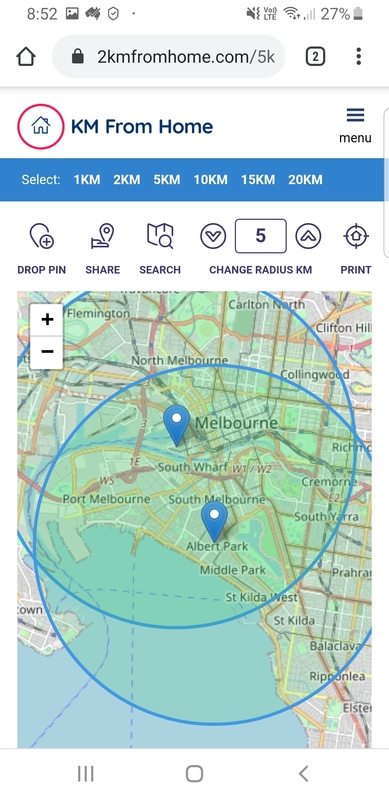
2020-09-28
Once restrictions started to lessen in Victoria following our second wave, it became common to use sites that calculated the radius we could travel from our homes to figure out if we could meet up with friends outside or walk somewhere different. In the later part of September in Melbourne, our permitted radius was 5km and we could meet up in groups of two for exercise or leisure outside for up to two hours. They had also just announced we could exercise within the same radius of our workplaces (if you were a 'permitted worker') which meant one of my circles overlapped with my best friend. This meant I could finally see her in person for the first time since June and the second time since March. (HIST30060)
-
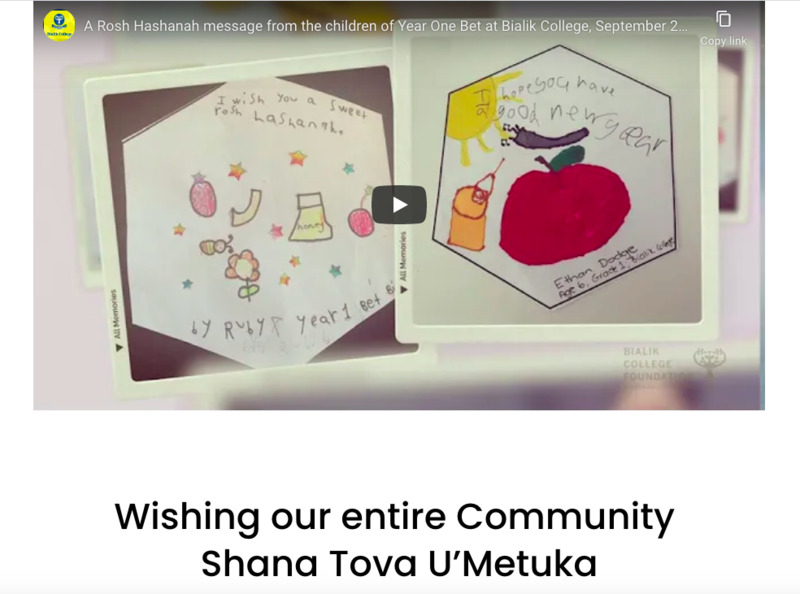
2020-09-15
"The children of Year One at Bialik College share with us their messages of love, hope and resilience" through Rosh Hashanah messages sent to residents of Emmy Monash Aged Care
-
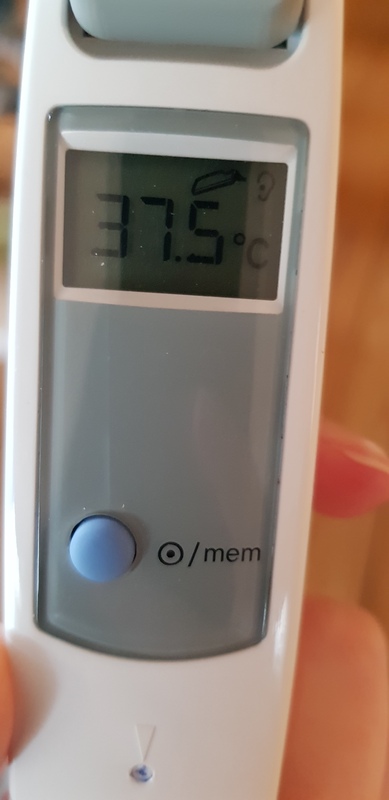
2020-09-11
In my household at least, temperature checks have become part of our regular routine, especially since two of us have been 'permitted workers' throughout the year and therefore still come into regular contact with the public. At this point Victoria was in it's second wave of the pandemic, we'd just been through winter and were into hay fever season: all of this made it very hard to tell when to get a test. In this case I had taken my temperature a couple of hours before work and had to decide if this borderline temperature was enough make me call in sick on such short notice. The government had announced a payment system for people who feared missing work to get tested due to the financial impact, but for me the problem has been managing managers expectations and creating difficulties for my workplace. I did get a test from a pop-up site at a local pool and I got a text message with the negative results in less than 24 hours.
 2020-10
2020-10 2020-09-03
2020-09-03 2020-07-20
2020-07-20 2020-03-13
2020-03-13 2020-07-05
2020-07-05 2020-06-19
2020-06-19 2020-07-16
2020-07-16 2020-03-17
2020-03-17 2020-07-23
2020-07-23 2020-07-15
2020-07-15 2020-09-16
2020-09-16 2020-10-01
2020-10-01 2020-10
2020-10 2020-03-13
2020-03-13 2020-03-20
2020-03-20 2020-04-03
2020-04-03 2020-09-19
2020-09-19 2020-09-27
2020-09-27 2020-09-18
2020-09-18 2020-09-20
2020-09-20 2020-09-28
2020-09-28 2020-09-29
2020-09-29 2020-09-29
2020-09-29 2020-10-08
2020-10-08 2020-10-06
2020-10-06 2020-03-07
2020-03-07 2020-10-07
2020-10-07 2020
2020 2020-10
2020-10 2020-04
2020-04 2020-04-01
2020-04-01 2020-08
2020-08 2020-08
2020-08 2020-11-08
2020-11-08 2020-07-26
2020-07-26 2020-11-08
2020-11-08 2020-04-30
2020-04-30 2020-11-05
2020-11-05 2020-03-21
2020-03-21 2020-04-17
2020-04-17 2020-04-08
2020-04-08 2020-11-05
2020-11-05 2020-11-05
2020-11-05 2020-03-23
2020-03-23 2020-11-04
2020-11-04 2020-09-28
2020-09-28 2020-09-28
2020-09-28 2020-09-15
2020-09-15 2020-09-11
2020-09-11